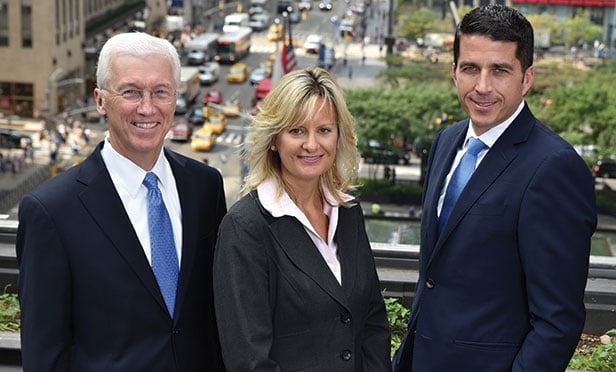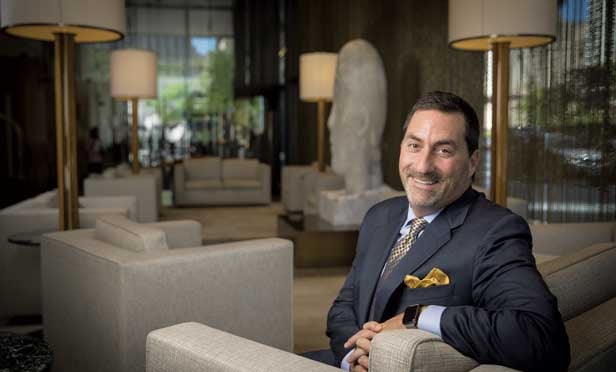This is an HTML version of an article that ran in Real Estate Forum. To see the story in its original format, click here.
When it comes to commercial real estate, everybody wants in. Deal velocity and pricing were up across the board in 2015, pointing to an increasingly competitive sales environment. A portion of the deal volume stemmed from cross-border capital flow that exceeded the levels seen in 2007—and resulted in a handful of enormous portfolio or entity-level acquisitions—but domestic buyers were out in force, as well. Partly on account of a broadening economic recovery that opened up opportunities beyond the gateway cities and partly on account of the search for yield, investors increasingly ventured into secondary and tertiary markets.
Against this backdrop, senior-level executives from six of the nation's largest institutions-—accounting for a collective $276 billion-plus in real estate assets under management globally—gathered last month at the New York Palace Hotel as part of the 11th annual Capital Markets Symposium. The session, hosted by Transwestern and Real Estate Forum, covered a variety of topics ranging from conditions in property sectors and markets across the US to strategic planning for 2016.
From their insights, it became clear that despite global uncertainty, these heavyweights have more than enough faith in US real estate fundamentals, and in their own investment strategies, to keep moving forward.—Sule Aygoren
PARTICIPANTS
Paul Boneham is an Executive Vice President with Bentall Kennedy in Seattle. He oversees some $11 billion in US real estate assets for the firm, which has an aggregate $42 billion in real estate AUM in North America.
Cristen Conkling is a Director and serves as a portfolio manager for AEW Capital Management. The Boston-based company has $50 billion in real estate assets under management globally, approximately half of which is in the United States.
Richard Coppola is a Managing Director and Head of Real Estate Transactions for TIAA-CREF, overseeing some $50 billion in US debt and equity. The New York City-based organization has an overall $86 billion in global real estate assets under management.
Michael Desiato (moderator) is Vice President & Group Publisher for ALM Real Estate Media in New York City.
Based in Atlanta, Tuba Malinowski serves as Portfolio Manager for Stockbridge Capital's $1.5-billion core fund. The $10-billion firm manages three opportunity fund series, two value funds and separate account clients, primarily on behalf of public pension funds.
Steve Pumper (moderator) serves as executive managing partner of Transwestern's Capital Markets and Asset Strategies Group in Dallas.
As Deputy CIO of Americas Real Estate, Global Real Assets, Doug Schwartz oversees all asset management and acquisitions activity for JP Morgan Asset Management. The New York City-based firm manages over $50 billion in real estate assets in the US, through 15 different fund formats.
Brian Watkins is a Managing Director and Acquisitions Officer for Clarion Partners. He co-leads a New York City-based team that operates in the Northeast, Midwest and Texas for the firm, which has $38 billion assets under management.
STEVE PUMPER: Investment activity in 2015 is up significantly from the prior year, thanks to a number of portfolio and entity-level transactions. Given that, it's a very competitive environment for commercial real estate. How are you differentiating yourselves when you're trying to place equity and debt capital?
BRIAN WATKINS: It's a standard procedure, really—trying to make sure we have a strong reputation as a buyer in the marketplace, doing what you say you're going to do. When you outline a timeline for due diligence in closing in a very competitive market, it's critical that you maintain those timeframes. We also close many of our transactions all cash, which is another way to differentiate yourself from the buyer pool. If we use financing, which is very low leverage usually, we put financing in place post closing. Additionally, we try to source off-market transactions to differentiate ourselves and identify strong relationships with individual sponsors, developers, etc.
CRISTEN CONKLING: Ours is a similar story; we bring to the table that certainty of closing. We're comfortable if we are not the first one selected with the top pricing, but we're there, ready and willing with the certainty of close, if a seller needs to shift gears. We value our joint venture relationships and many times they bring us deals to recapitalize.
RICHARD COPPOLA: The best source of business is through my equity team because of the competitive deal environment. If we can't invest on the equity side we can often get in with debt although, leads rarely work in the inverse, of course. What's a little bit different this year is we've been very active in mezzanine debt again. It's kind of a core space. We've been active in that 50% to 60% slice of the capital stack behind large, single asset deals in places like New York, Boston and San Francisco. That's been a great relative value play. This year, in particular, we far exceeded our expectations in what we wanted to place in that space.
Most of that is from the general account. But we've also raised some capital in Korea to invest alongside us in that space. When you get the sovereign wealth fund money, they don't come with $25 million; they come with $500 million. The value proposition there is pretty good, for us, as we grow our asset management business.
We opened an online bank a few years ago, TIAA Direct FSB. We're a financial services company with a large pension business and a lot of our constituents are hitting retirement age. We want to keep their funds within the system and, to do that, you want to be a full-service provider for all financial products.
While everybody else is selling their banks, we're actually opening a bank. So, we're a little contrarian. The bank is another source of capital seeking mortgage loan investments. We actually went out and built a team that's been very successful this year in placing capital; we did over $300 million in $5-million to $20-million deals.
PAUL BONEHAM: There are two primary components to my answer. One is having a real, thought-out focus on what you want to do, and then clearly communicating it to the team and, ultimately, to the market. We're primarily focused on about 15 large markets. We've elected to focus most of our efforts there and less on secondary markets. Secondly, we have always embraced a build-to-core approach. Historically, that's accounted for 40% to 50% of our investment activity in a typical year.
There are pros and cons to that strategy. The costs of construction and land have become very high, so we have to look at a lot of opportunities to pick the ones that make the most sense. We're developing urban apartments, not suburban. We're developing industrial in New York, Northern New Jersey, Oakland and the Bay Area. We actually invested, on a structured basis, in an office building development in Hollywood, and we took down a large parcel of land in San Jose, CA for which we're designing an office product to match the unique Silicon Valley market demands.
Want to continue reading?
Become a Free ALM Digital Reader.
Once you are an ALM Digital Member, you’ll receive:
- Breaking commercial real estate news and analysis, on-site and via our newsletters and custom alerts
- Educational webcasts, white papers, and ebooks from industry thought leaders
- Critical coverage of the property casualty insurance and financial advisory markets on our other ALM sites, PropertyCasualty360 and ThinkAdvisor
Already have an account? Sign In Now
*May exclude premium content© 2024 ALM Global, LLC, All Rights Reserved. Request academic re-use from www.copyright.com. All other uses, submit a request to [email protected]. For more information visit Asset & Logo Licensing.











